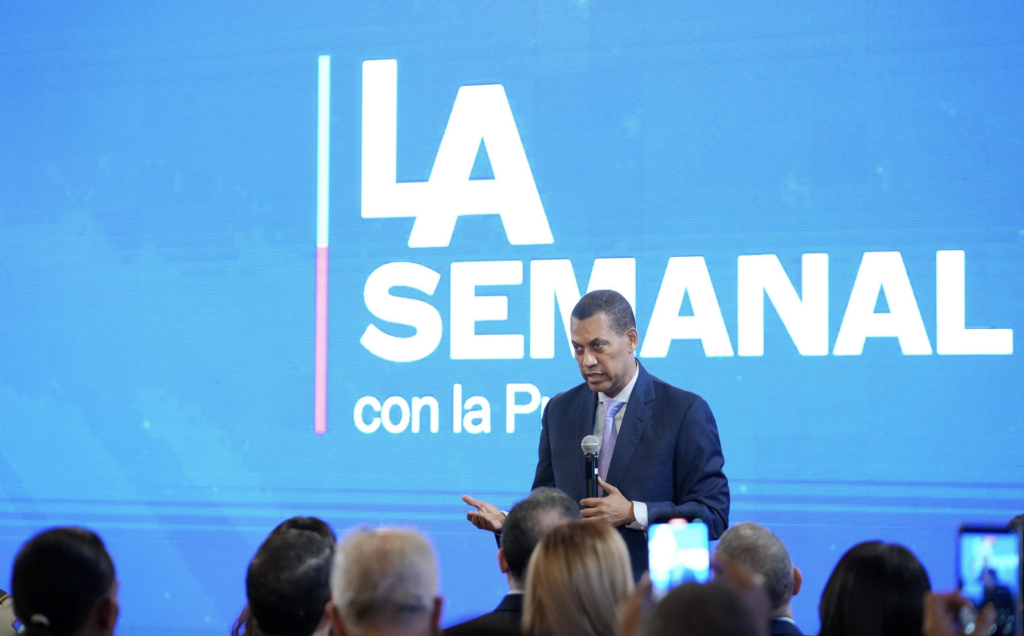
Guido Gómez Mazara, president of the Board of Directors of the Dominican Telecommunications Institute (Indotel), outlined a series of strategic initiatives aimed at revolutionizing the nation’s telecommunications landscape. On 19 May 2025, speaking at “La Semanal con la Prensa,” Gómez Mazara emphasized the new government efforts to place technology at the service of the population and bridge the digital divide in communities across the Dominican Republic.
To highlight the fast-paced advances, he said that for the first time in Dominican history more people were added to connectivity, 6.5%, than those who achieved reading skills. He spoke of advancing the Indotel program to bring connectivity to populations, schools and hospitals in areas that had been ignored by telecoms because of their low financial yields.
Gómez Mazara proudly detailed the sector’s advancements during his nine-month tenure, including the expansion of Digital Terrestrial Television (DTT), the widespread deployment of fiber optics, internet connectivity for police detachments, the installation of signal blockers in correctional facilities, and enhanced spectrum supervision.
Joining President Luis Abinader, Gómez Mazara detailed several key projects, including a telemedicine pilot program, a new national connectivity tender, the establishment of technology centers and the use of digital technology to enhance security.
The president of Indotel said the most common theft in the country is that of cell phones. He spoke of the pilot program to block the signal at the jails of 15 de Azua, El Pino (La Vega) and Anamuya (Higuey). The intention is to expand the program to all jails.
A cornerstone of the new strategy is a telemedicine pilot program, designed to expand healthcare access in remote areas. This initiative will facilitate remote diagnoses and medical consultations through digital platforms. The program is coordinated with the University of Cincinnati in the United States.
Gomez Mazara also announced a second national tender to extend Internet connectivity across the entire Dominican territory. The undertaking is backed by a US$20 million loan from the Inter-American Development Bank (IDB), that aligns with the government’s pledge to ensure all citizens have access to essential services like education, health, and employment via the Internet, regardless of their geographic location.
Gómez Mazara further highlighted the progress of Digital Skills Centers and Rapid Skills Points. These spaces are dedicated to specialized technological training, focusing on employability and entrepreneurship. He revealed plans for a new center in Santiago province, soon to open with classrooms and workshops in programming, artificial intelligence, data analytics, and automation, aiming to reach an estimated 588 young people. Another center in Santo Domingo Oeste will offer specialized programs in cybersecurity, cloud computing, and 3D printing.
The Indotel president also underscored the push for a radial sovereignty plan in border areas, framing it as a vital component of the current administration’s territorial and technological sovereignty strategy.
He outlined four key pillars guiding Indotel’s actions: closing the digital divide, connecting institutions for the common good, ensuring telecommunications security, and strengthening surveillance and control of the radioelectric spectrum.
Looking ahead, he said a priority objective for Indotel is the modernization of General Telecommunications Law 153-98. This crucial update aims to refine the sector’s regulatory framework, encourage investment, and establish a more contemporary, inclusive regulation that aligns with international standards.
The Indotel is moving to a new building on Av. 27 de Febrero this summer. The 27 de Febrero is becoming the location of choice for several major government offices.
Read more in Spanish:
Indotel
Diario Libre
7 Dias
El Dia
La Semanal 19 May 2025
20 May 2025

